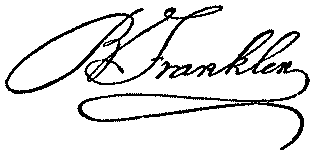|
|
Benjamin Franklin
(January 17 [O.S. January 6] 1706 – April 17, 1790)
|
|
was one of the most prominent Founding Fathers of the United States. He was a leading printer, scientist, inventor, civic activist and diplomat. As a scientist he was a major figure in the history of physics for his discoveries and theories regarding electricity. As a political writer and activist he, more than anyone, developed the idea of an American nation, and as a diplomat during the American Revolution secured the French alliance that made independence possible.
Whate'ers begun in anger ends in shame. 1734
If what most men admire, they would
despise,
'Twould look as if mankind were growing wise. 1735
Humility makes great men twice honourable. 1735
After crosses and losses men grow humbler and wiser. 1737
Search others for their virtues, thy self for thy vices. 1738
Each year one vicious habit rooted out,
In time might make the worst Man good throughout. 1738
If thou injurest Conscience, it will have its Revenge on thee. 1739
Haste makes Waste. 1753
Silence is not always a Sign of Wisdom, but Babbling is ever a Mark of Folly. 1758
Virtue may not always make a Face handsome, but Vice will certainly make it ugly. 1758
He that's content, hath enough; He that complains, has too much. 1758
Away then, with your expensive follies, and you will not have then so much reason to complain of hard times, heavy taxes, and chargeable families. 1758
From a child I was fond of reading, and all the little money that came into my hands was ever laid out in books.
This library afforded me the means of improvement by constant study, for which I set apart an hour or two each day, and thus repair'd in some degree the loss of the learned education my father once intended for me. Reading was the only amusement I allow'd myself. I spent no time in taverns, games, or frolicks of any kind; and my industry in my business continu'd as indefatigable as it was necessary.
A Democracy will vote away its rights.
Lost Time is never found again; and what we call Time-enough, always proves little enough: Let us then up and be doing, and doing to the Purpose; so by Diligence shall we do more with less Perplexity. 1758
Hide not your talents, they for use were made, what good is a sundial in the shade.
|
|
Those who would give up Essential Liberty to purchase a little Temporary Safety deserve neither Liberty nor Safety.
Franklin sought to cultivate his character by a plan of thirteen virtues, which he developed at age 20 (in 1726) and continued to practice in some form for the rest of his life. His autobiography (see references below) lists his thirteen virtues as:
"TEMPERANCE. Eat not to dullness; drink not to elevation."
"SILENCE. Speak not but what may benefit others or yourself; avoid trifling conversation."
"ORDER. Let all your things have their places; let each part of your business have its time."
"RESOLUTION. Resolve to perform what you ought; perform without fail what you resolve."
"FRUGALITY. Make no expense but to do good to others or yourself; i.e., waste nothing."
"INDUSTRY. Lose no time; be always employ'd in something useful; cut off all unnecessary actions."
"SINCERITY. Use no hurtful deceit; think innocently and justly, and, if you speak, speak accordingly."
"JUSTICE. Wrong none by doing injuries, or omitting the benefits that are your duty."
"MODERATION. Avoid extremes; forbear resenting injuries so much as you think they deserve."
"CLEANLINESS. Tolerate no uncleanliness in body, cloaths, or habitation."
"TRANQUILLITY. Be not disturbed at trifles, or at accidents common or unavoidable."
"CHASTITY. Rarely use venery but for health or offspring, never to dulness, weakness, or the injury of your own or another's peace or reputation."
"HUMILITY. Imitate Jesus and Socrates."
